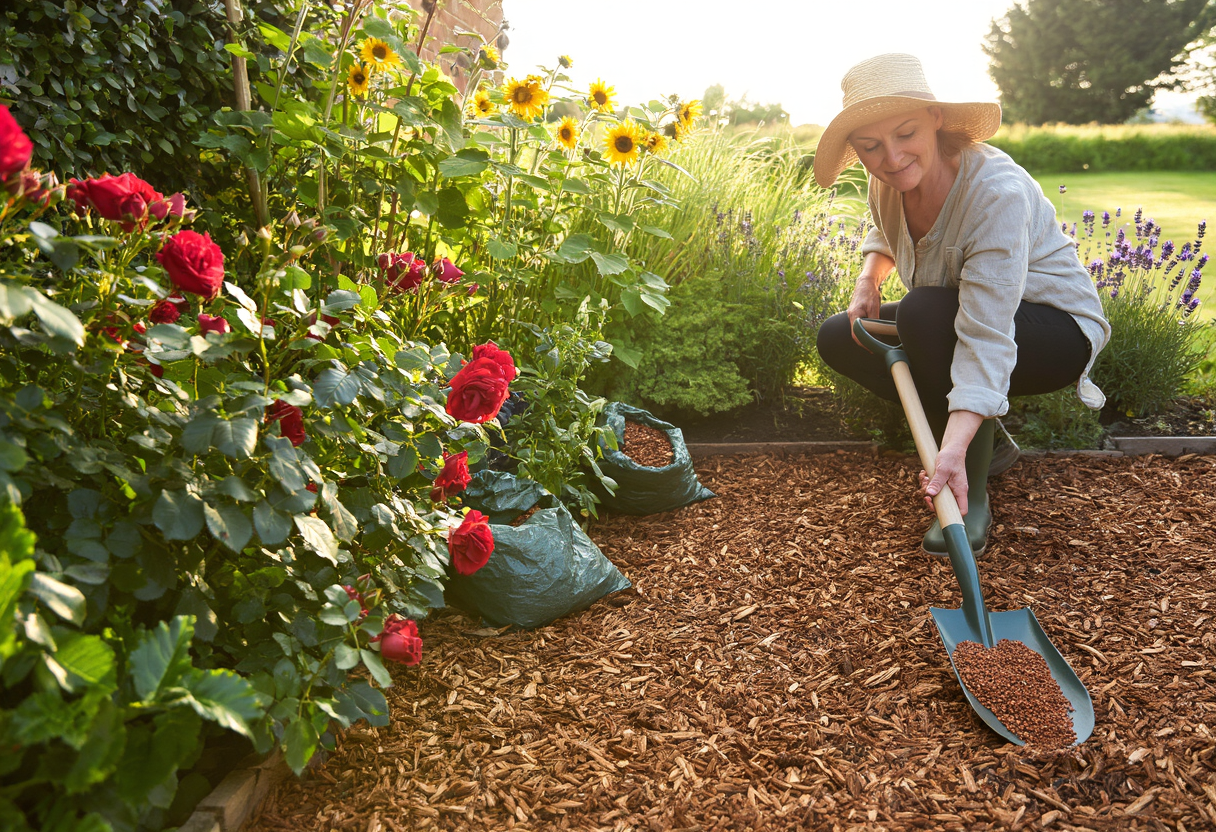Unleashing the Power of Mulch and Fertilizers: Enhancing Your Garden's Growth
Explore how mulch and fertilizers can transform your gardening experience through enhanced nutrient delivery and soil protection. Delve into the best practices for choosing and applying these essential materials, ensuring your garden flourishes year-round with healthy plants and vibrant blooms.
Understanding the Role of Mulch and Fertilizers
Mulch and fertilizers play a crucial role in gardening and landscaping, providing essential nutrients and protective layers for plants. Mulch, usually made from organic materials, protects the soil and retains moisture, while fertilizers supply necessary nutrients like nitrogen, phosphorus, and potassium. The combination of mulch and fertilizers can optimize plant growth, creating a healthier and more vibrant garden. Additionally, using mulch can help regulate soil temperature, combat weeds, and enhance the aesthetic appeal of garden beds. It is essential to select the right type of mulch and fertilizers tailored to your garden's specific needs, as this can significantly impact the overall health of your plants. Furthermore, understanding the interactions between mulch and fertilizers can lead to better planting strategies and improved soil health. Overall, incorporating mulch and fertilizers into your gardening routine is not only beneficial but essential for sustainable practices.
Choosing the Right Mulch and Fertilizers for Your Plants
Selecting the appropriate mulch and fertilizers can be daunting given the myriad of options available. Organic mulches, such as wood chips, straw, and leaves, decompose over time, enriching the soil with nutrients. In contrast, synthetic fertilizers provide an immediate nutritional boost, but they can lead to potential runoff issues if not applied judiciously. When choosing fertilizers, consider soil tests to determine nutrient deficiencies, allowing for targeted applications that complement the effects of mulch. Additionally, keep in mind the specific needs of different plant species; for instance, acid-loving plants require distinct soil conditions compared to others. It might also be wise to consult local gardening centers for advice on regional best practices regarding mulch and fertilizers. Thus, effectively blending the two can significantly enhance growing conditions. Regularly revisiting your choices will allow your garden to adapt to changing conditions and requirements as seasons shift.
The Environmental Benefits of Using Mulch and Fertilizers
The environmental advantages of using mulch and fertilizers are significant and multifaceted. Mulch reduces soil erosion and protects against nutrient leaching, while organic fertilizers can improve soil structure and promote biodiversity. By adding mulch, you create a habitat for beneficial organisms such as earthworms and microbes that can further enhance soil health. Fertilizers, particularly those derived from organic sources, contribute to a sustainable cycle of nutrient replenishment. Additionally, the combination of mulch and fertilizers aids in carbon sequestration, minimizing greenhouse gas emissions. Choosing environmentally friendly options ensures that your gardening practices contribute positively to the ecosystem. Moreover, employing these materials can lead to lower water usage, as mulch retains moisture for longer periods, reducing the need for frequent irrigation. Adopting these strategies not only nurtures your plants but also supports a healthier planet.
Common Mistakes When Applying Mulch and Fertilizers
While mulch and fertilizers are beneficial, gardening enthusiasts often make common mistakes that can hinder their effectiveness. An overly thick layer of mulch can impede water penetration and create a breeding ground for pests. Likewise, excessive application of fertilizers may lead to nutrient overload and potential plant burn. It's critical to understand the appropriate application rates and timing to maximize the benefits. For instance, timing the fertilizer application just before planting or during pivotal growth phases can have significant outcomes. It's equally important to ensure that mulch is kept away from plant stems to allow for proper airflow and moisture management. Regular monitoring of soil health and plant responses to these practices will keep your garden thriving. Educating oneself on the complexities of mulch and fertilizers can prevent costly errors and enhance overall gardening success.
Innovative Techniques for Using Mulch and Fertilizers
Gardening innovation is at the forefront of using mulch and fertilizers effectively. Techniques such as layering, where different types of mulch are combined, can enhance nutrient retention and aesthetics. The use of slow-release fertilizers allows for sustained nutrient availability throughout the growing season, reducing the need for frequent applications. Additionally, integrating cover crops into your gardening strategy can enhance soil health while augmenting the benefits of mulch and fertilizers. These crops contribute organic matter and fix nitrogen in the soil, creating a harmonious ecosystem that meets the plants' nutritional needs. Implementing a mulching regime that alternates between various materials can boost biodiversity, benefiting beneficial organisms. Experimenting with different combinations and feedback from your garden can lead to unique value-added approaches that further enrich your planted areas. The fusion of creativity and science in gardening can transform traditional practices into cutting-edge methods.
The Future of Gardening: Mulch and Fertilizers in Focus
As the demand for sustainable gardening solutions grows, the future of mulch and fertilizers seems promising. Advancements in technology and research will continue to introduce new organic options that are both efficient and environmentally friendly. Innovations in biodegradable mulch and natural fertilizers are being explored to further lessen the ecological footprint of gardening. Consumers are becoming more aware of the importance of responsible gardening practices, and companies are responding with products designed to meet these needs. The amalgamation of mulch and fertilizers will increasingly emphasize organic, sustainable methods, ensuring gardeners can contribute positively to their environments. As gardening becomes more mainstream, community initiatives promoting the importance of proper mulch and fertilizer use are expected to flourish. Thus, a holistic approach to gardening that emphasizes health and sustainability is not merely a trend but a necessary evolution for the future.
